Congress returns to work facing major decisions on Biden's agenda and infrastructure
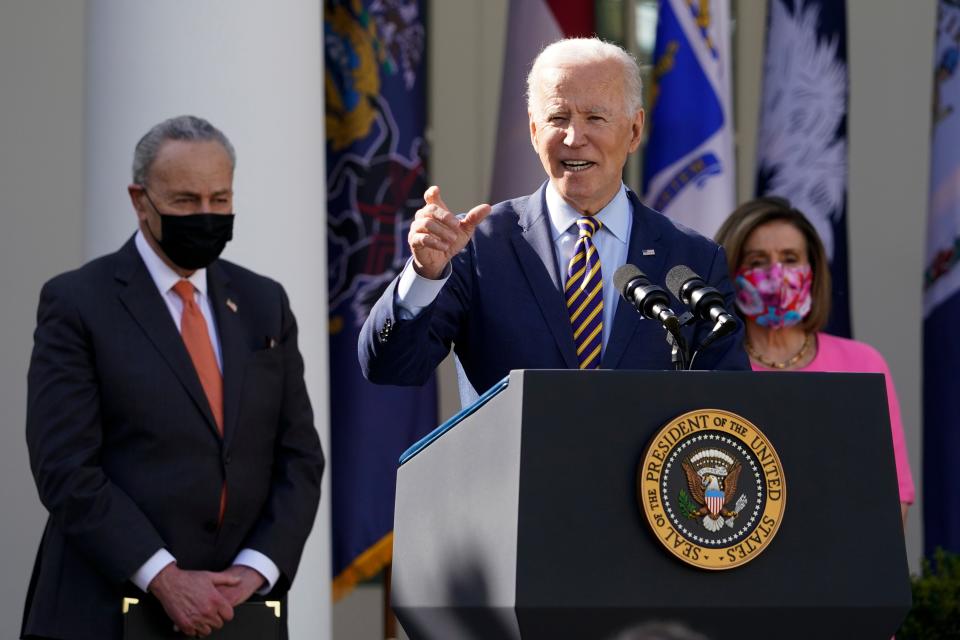
WASHINGTON – Congress gets back to work Monday facing several major decisions that will test Democratic unity in the coming weeks as lawmakers vote on President Joe Biden’s domestic agenda, routine funding for the federal government and the size of the federal debt.
Part of the reason for the collision of so many big-ticket spending bills is that lawmakers approved a two-year deal in 2019 for more spending and a suspension of the debt limit. The bills are coming due while pressure builds to pass Biden's $3.5 trillion budget bill and a $1.2 trillion transportation plan to fund roads and bridges.
The Senate ran into a hurdle Sunday, when the parliamentarian ruled that immigration provisions can't be included in the $3.5 trillion package because the provisions are "merely incidental" to the budget. Democratic leaders must decide whether they can salvage or must drop the provisions.
A thorny policy debate governing election law also looms.
Here are some of the issues that will dominate the end of September and early October:
House deadline looms for infrastructure bill
The $1.2 trillion in infrastructure spending is popular, but its fate has been linked to the much more contentious $3.5 trillion budget package.
The Senate approved the infrastructure bill, which has $550 billion in new spending, on a bipartisan 69-30 vote last month. Rather than rubber-stamping the measure and sending it to Biden, the House agreed to vote on it by Sept. 27, so it could move in tandem with the $3.5 trillion package that no Republicans support.
A group of nine moderate House Democrats insisted on a stand-alone vote on infrastructure with a relatively firm date. A larger group of liberal Democrats insisted that both measures move together, so support for the larger package doesn't evaporate after infrastructure is approved.
House Democrats are still assembling the $3.5 trillion package with contributions from 13 committees that finished their portions last week. The Budget Committee will combine those pieces into a single bill. Then the Rules Committee could tweak the language before sending the bill to the floor. The race is on to get that work done near Sept. 27.
"We will pass that legislation," House Speaker Nancy Pelosi, D-Calif., said of infrastructure, but only in combination with the larger package.
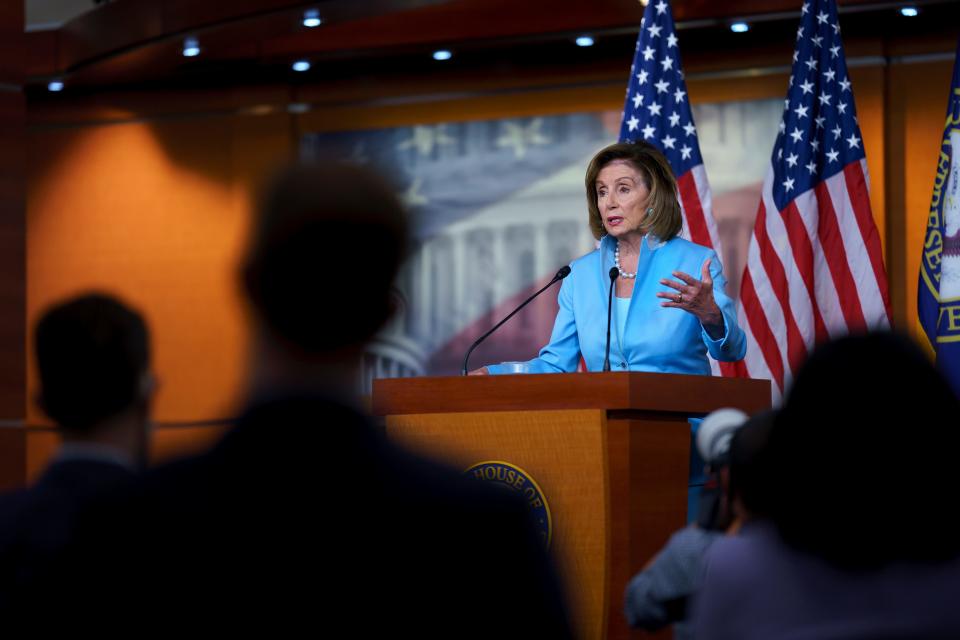
House will tinker with $3.5 trillion budget plan
The challenge for the $3.5 trillion package is all about numbers. The size of the package has drawn concerns from even a few Democrats. The party holds a narrow majority in the House, so just a few Democratic defectors threaten to trim or alter the proposal.
The package carries Biden priorities such as expanding Medicare to include vision, dental and hearing benefits, providing federally subsidized pre-kindergarten and community college, and financing 12 weeks of paid family and medical leave for workers.
To pay for those programs, the Ways and Means Committee agreed to overturn much of the Trump administration tax cut from 2017, raising $2.2 trillion largely from corporations and people earning more than $400,000 per year.
Business fighting Biden: Business groups fight Biden's $3.5T budget over Medicare, tax and climate plans
Democrats have a 220-212 advantage in the House, so opposition from at least four of them could kill the $3.5 trillion package. Several Democrats have voiced concern about the amount of spending in the package.
Three Democrats joined Republicans on the Energy and Commerce Committee in blocking a provision calling for Medicare to negotiate the price of prescription drugs. But the Ways and Means Committee approved the provision, so it could be included in the final package.
If the House approves the package, the Senate must consider it. Senators have been working with House members on compromise language that could win approval in both chambers.
Democrats hope to pass the bill in the Senate without support from Republicans, who oppose the legislation. Using a process called reconciliation, Democrats could pass a bill on their own, but getting all members of their party on board hasn't been smooth.
Democratic Sens. Joe Manchin of West Virginia and Kyrsten Sinema of Arizona said the $3.5 trillion price tag is too much for them to support.
The strategy for approving the legislation with a simple majority of Senate Democrats, which is called reconciliation, requires provisions to impact spending in a significant way.
The Senate parliamentarian, Elizabeth MacDonough, ruled against including provisions that aimed to grant an estimated 8 million undocumented immigrants a path to permanent residency. She said the legislative language is “by any standard a broad, new immigration policy," which would require another bill.
Senate Majority Leader Chuck Schumer, D-N.Y., said Democrats are disappointed with the decision, but that they will seek options during discussions with the parliamentarian in the coming days.
“We are deeply disappointed in this decision but the fight to provide lawful status for immigrants in budget reconciliation continues,” Schumer said.
Biden discussed the package Thursday by phone with Pelosi and Schumer to coordinate how to approve their priorities under the president’s slogan: “Build Back Better.”
“The three are in regular touch and engaging daily on bringing Build Back Better to the finish line,” the White House said in a summary of the call.
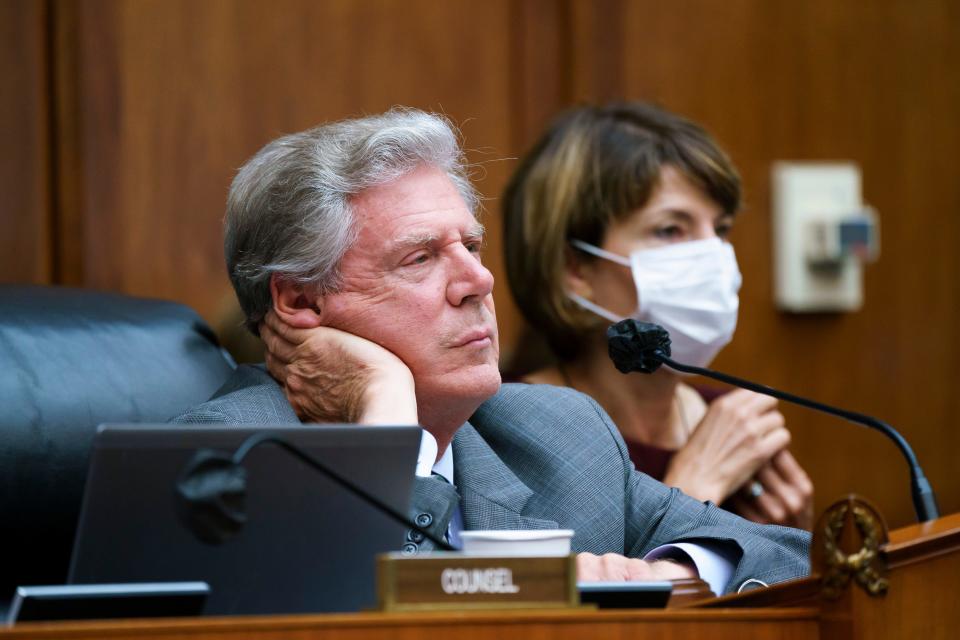
Congress must extend routine government funding
Against the backdrop of Biden's priorities, the federal government is set to run out of money for its routine operations Oct. 1. To keep the lights on from the National Zoo in Washington to Denali National Park in Alaska, lawmakers will need to approve a temporary extension of funding until legislation for the entire fiscal year is ready.
The House Rules Committee, which determines how bills are debated on the floor, scheduled a meeting Monday for the temporary extension of funding, which is called a continuing resolution.
Disputes over spending have shut down the federal government for short periods, including 35 days in late 2018 and early 2019 and 16 days in 2013.
During a shutdown, crucial functions such as the military and air-traffic control continue to operate, but discretionary functions such as national parks close down.
Debt limit: White House says not raising debt limit would halt 'billions of dollars' for state, federal programs
A wild card in negotiations over the continuing resolution is whether to add spending to regular government operations. Biden proposed $24 billion for relief from disasters such as hurricanes and wildfires and $6.4 billion to help resettle Afghan refugees.
“We’re not going to leave these people in distress,” Biden said while touring wildfire destruction in California.
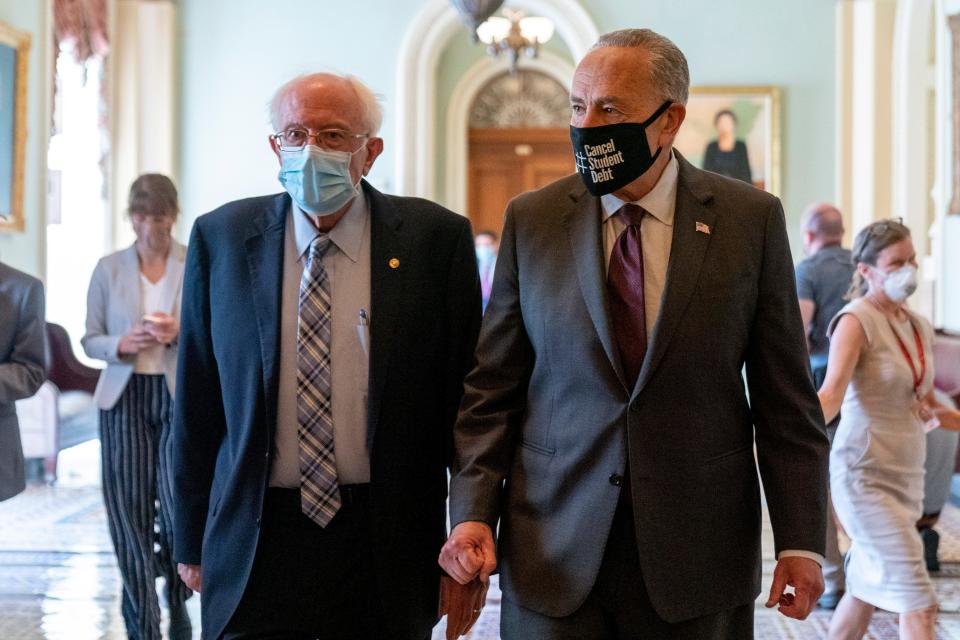
Increasing debt limit
The government also needs to increase the amount it borrows, called the debt limit.
Treasury Secretary Janet Yellen sent Pelosi a letter Sept. 8 warning that “extraordinary measures” the country uses to repay its debt “will be exhausted during the month of October.”
Ignoring the debt limit could harm the country’s borrowing ability. Other countries and investors could demand higher interest rates to finance debt.
Yellen warned that delaying a decision could lead to irreparable damage to the U.S. economy and global financial markets, if they lose confidence in the country’s ability to pay its bills.
The fight is more political than financial. Republicans threaten to force Democrats to raise the debt limit on their own, so voters could be reminded about their taxing and spending in the next election.
Senate Minority Leader Mitch McConnell, R-Ky., acknowledged the debt limit needs to be raised, but he said Republicans would let Democrats do it on their own because they pursued the $3.5 trillion budget package without Republican support.
"Let’s be clear: With a Democratic President, a Democratic House, and a Democratic Senate, Democrats have every tool they need to raise the debt limit. It is their sole responsibility," McConnell said in a tweet. "Republicans will not facilitate another reckless, partisan taxing and spending spree."
Pelosi called that strategy “totally irresponsible.” She noted that Democrats joined Republicans in raising the debt limit three times during the Trump administration, when the debt increased $7 trillion.
"Mitch has been running around Kentucky taking credit for a lot of the spending that is now requiring us to raise the debt limit, but Mitch doesn't really care about seeming inconsistent or hypocritical. He says whatever is expedient," Rep. John Yarmuth, D-Ky., said on "Fox News Sunday."
“The Constitution says the full faith and credit of the United States is not to be in doubt,” Pelosi said. “People say, ‘Oh, you just want to spend money.’ No. We’re paying the credit card, the Trump credit card, with what we would do to lift the debt ceiling.”
Schumer called efforts to play games with the debt “reckless, irresponsible, despicable.”
“We did not resort to hostage taking or proclaim that it was the other side’s responsibility,” Schumer said. “We simply knew that when it came to the debt ceiling, it was important to put aside political differences and act responsibly, no matter who sits in the Oval Office.”
"We actually raised, on a bipartisan basis, the debt ceiling in the last Congress because on a bipartisan basis we agreed on what to spend the money on," Sen. Bill Cassidy, R-La., said on CNN's "State of the Union" Sunday. "This time, Democrats want to increase the debt ceiling for their reconciliation bill, which they’re passing on a party line basis.”
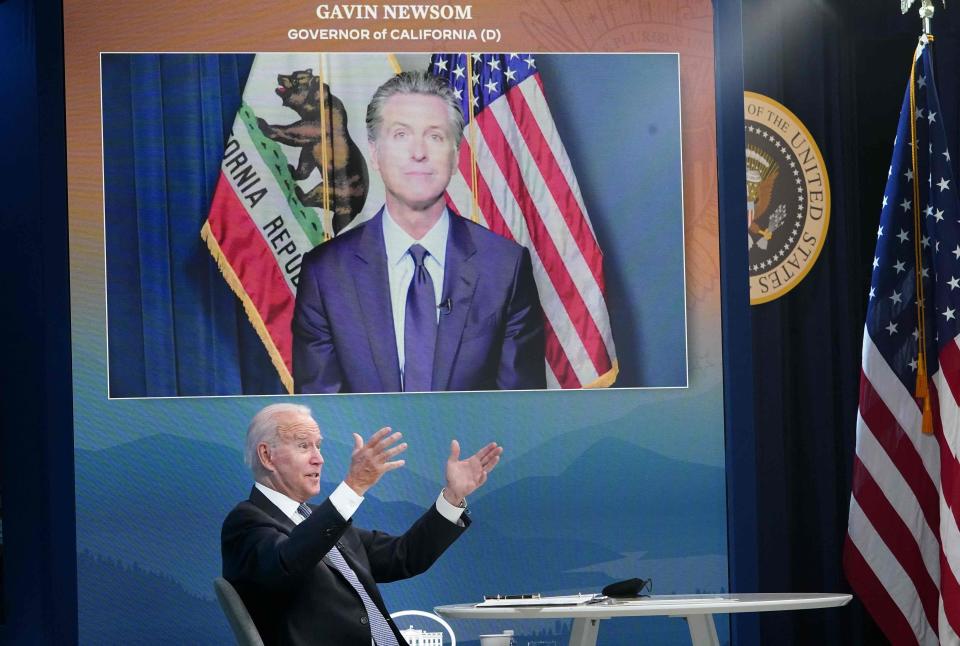
Senate to vote on voting rights
The Senate could take action as early as this week on a voting rights bill that aims to overturn state restrictions.
The Democratic proposal is a pared-down version of a voting rights bill Democrats failed to pass earlier this year.
State voting rights: Lawsuits challenging state voting restrictions could alter rules for 2022 midterms, 2024 presidential election
Republicans have remained unified against election legislation, arguing that Democrats are trying to codify advantages to keep themselves in power rather than enhance voting security through tighter control over ballots and when they are cast.
House Democrats approved expansive legislation in August that would restore portions of the 1965 Voting Rights Act overturned by Supreme Court decisions. The evenly divided Senate hasn’t taken up the bill amid Republican opposition and concerns among some Democrats.
Voting rights: Senate Democrats unveil voting rights bill in latest effort to bring federal rules to elections
Manchin proposed a narrower bill that Senate Democrats rallied behind that would expand early voting options, allow for registration on Election Day and battle partisan gerrymandering in determining the maps for House seats.
Manchin looks for support from 10 Republicans who would need to join 50 members of the Democratic caucus to overcome a filibuster that could block and kill the bill.
McConnell said Republicans oppose federalizing rules because states take different approaches to how they conduct elections.
"It is a solution in search of a problem, and we will not be supporting that," McConnell said.
Schumer said the chamber could vote as soon as this week on the legislation. If approved, the bill would head back to the House in search of a compromise.
This article originally appeared on USA TODAY: Biden's tax, infrastructure plans on the line as Congress returns

 money
money 




